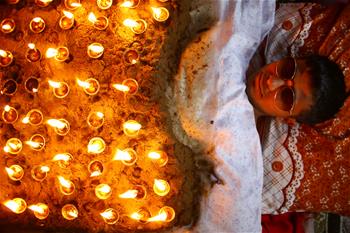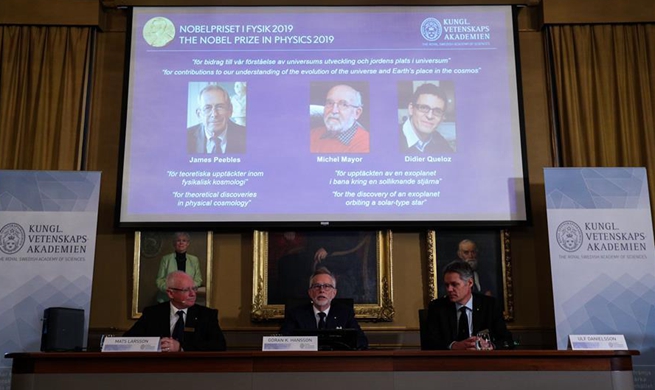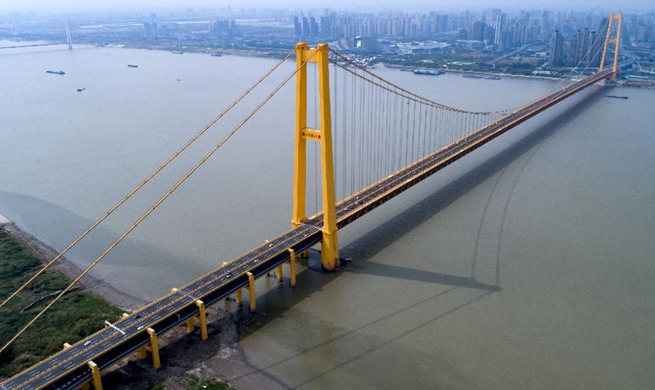by Zeynep Cermen
ISTANBUL, Oct. 8 (Xinhua) -- A series of disaster-oriented urban transformation projects, plus an extensive training program, have been launched in Istanbul after a 5.8-magnitude earthquake hit the largest city and economic hub in Turkey late last month.
"We are not talking about an urban reconstruction plan in the form of destroying the old ones and building high-rise apartment blocks," Tayfun Kahraman, head of the city's Earthquake Risk Management and Urban Renewal Department, told Xinhua in a recent interview.
"We are talking about running a process that would be an ointment to the wound," he said.
In his view, the tremor on Sept. 26 laid bare how unprepared the metropolis was in the face of a major disaster, raising many questions about the safety of buildings and residents.
For geologists, the latest quake is a strong warning for Istanbul, as it raised the prospect of the fault on the Marmara Sea off the city to be broken with a tremor as strong as 7.4 magnitude.
At a recent press conference, Bogazici University Kandilli Observatory and Earthquake Research Institute noted that as the activity is approaching the central fault, it becomes evident that the projected earthquake would certainly occur.
The city's projection about the safety conditions of the structures across the city does not justify any optimism unless urgent precautions are taken, said Kahraman.
"Today, our estimations show that around 50,000 buildings will suffer severe or very severe damage during a strong earthquake which is likely to occur in Istanbul," he said. "Unfortunately, people will die under the ruins of these structures and we have to prevent this."
The authorities have so far received over 5,300 reports about risks, mainly in areas close to the epicenter of the latest earthquake. A total of 250 buildings were assessed as heavily damaged, while 15 schools, several dormitories and a veterinary school have been permanently evacuated.
"The tremor is even not a moderately strong one. Imagine what the results would be in case of a much more violent one," Kahraman remarked, saying that two-thirds of 1.16 million buildings across the city should be overhauled or checked under the new transformation plan within five years.
Another issue on the city's agenda is the designation of more disaster assembly areas, as Istanbul residents do not know what to do or where to go when the disaster strikes, Kahraman noted.
"These areas should be within the first 500 meters for people after they leave their homes," he explained, saying currently there are over 850 assembly points across the city to meet some basic needs of residents.
"We are trying to create new points while testing the convenience of the existing ones, according to several criteria," he said.
According to the city's projections, 2 million people will have to gather in these areas following a big earthquake. "This shows that we need a total of 10 million square meters throughout Istanbul," said Kahraman.
For the moment, Kahraman and his teams are trying to determine the best possible evacuation track for each building to the nearest assembly point. In the end, they will unveil all the necessary information through a mobile application that works offline.
The city has also started a series of training programs involving 500 to 600 trainers to teach residents and students what to do in case of disasters.
Meanwhile, Istanbul residents continue to ask local authorities to make secure their buildings in the wake of the latest tremor.
Nilgun Iscan and her family used to live in an apartment on the 13th floor of a building in the Sisli district, but have been unable to return home following the Sept. 26 quake that caused damage to the bearing walls in the basement.
"After that, we moved to my mother's apartment, which we believe is relatively safe," Iscan told Xinhua.
The family applied to the city for an urgent check of their apartment. "Now we are waiting for the municipality report before we start to look for a rental apartment in a new building," said Iscan.
Havva Soner, a building manager in the Besiktas district, has also asked local authorities to check the building she lives in although the management did not detect any crack on the walls.
"Everyone is worried," Soner said. "Nobody can be sure of the soundness of their buildings."
The worry about a bigger quake in Istanbul and the preparation for it has been a hot topic on Turkish social media postings since the latest tremor.
"Everyone is asking me whether we are prepared for the Big One," read one tweet. "How can I be ready? All I can do is to prepare a so-called earthquake bag, with some underwear, biscuits, and a whistle."
Their anxiety is not unfounded. In August 1999, a 7.4-magnitude earthquake jolted Turkey's northwestern province of Kocaeli, about 100 km east of Istanbul, leaving nearly 18,000 dead, including 984 in Istanbul.

















